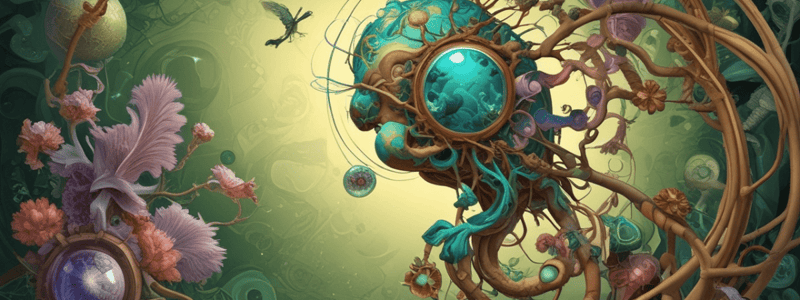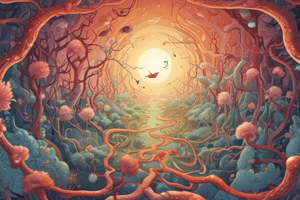Podcast
Questions and Answers
What is the primary focus of biology?
What is the primary focus of biology?
- Study of human behavior
- Scientific study of life and living organisms (correct)
- Study of the universe
- Study of non-living organisms
Which branch of biology focuses on the study of plants?
Which branch of biology focuses on the study of plants?
- Zoology
- Botany (correct)
- Genetics
- Ecology
What is the primary function of carbohydrates in living organisms?
What is the primary function of carbohydrates in living organisms?
- To produce hormones
- To transmit genetic information
- To provide energy and structure (correct)
- To regulate body temperature
What is the basic unit of life in biology?
What is the basic unit of life in biology?
What is the process by which cells convert light energy into chemical energy?
What is the process by which cells convert light energy into chemical energy?
What is the study of the inheritance of traits from one generation to the next?
What is the study of the inheritance of traits from one generation to the next?
What is the term for the variety of species, genes, and ecosystems?
What is the term for the variety of species, genes, and ecosystems?
What is the process by which new species are formed?
What is the process by which new species are formed?
Flashcards
What is Biology?
What is Biology?
The study of all living organisms and their interactions with the environment, encompassing fields like botany, zoology, and ecology.
What is a cell?
What is a cell?
The basic building block of life, containing a plasma membrane, cytoplasm, and genetic material.
What is photosynthesis?
What is photosynthesis?
The process by which organisms convert light energy into chemical energy, making food for themselves.
What is evolution?
What is evolution?
Signup and view all the flashcards
What is genetics?
What is genetics?
Signup and view all the flashcards
What is biodiversity?
What is biodiversity?
Signup and view all the flashcards
What is ecology?
What is ecology?
Signup and view all the flashcards
What is biochemistry?
What is biochemistry?
Signup and view all the flashcards
Study Notes
Definition and Scope
- Biology is the scientific study of life and living organisms
- Examines structure, function, growth, evolution, distribution, and taxonomy of all living things
- Encompasses various disciplines, including botany, zoology, microbiology, ecology, and biochemistry
Branches of Biology
- Botany: study of plants
- Zoology: study of animals
- Microbiology: study of microorganisms
- Ecology: study of interactions between organisms and their environment
- Biochemistry: study of chemical processes within living organisms
- Molecular Biology: study of biological molecules and their interactions
- Genetics: study of heredity and variation
- Evolutionary Biology: study of evolution and its mechanisms
Biological Molecules
- Carbohydrates: provide energy and structure
- Proteins: perform various functions, including enzymes, hormones, and structural roles
- Lipids: provide energy, structure, and serve as hormones
- Nucleic Acids (DNA and RNA): contain genetic information
- ATP (Adenosine Triphosphate): energy currency of the cell
Cell Biology
- Cell: basic unit of life, consisting of plasma membrane, cytoplasm, and genetic material
- Cellular processes:
- Metabolism: energy conversion and chemical reactions
- Photosynthesis: conversion of light energy into chemical energy
- Cell division: replication and reproduction
- Cell signaling: communication and response to stimuli
Genetics and Evolution
- Mendelian Genetics: study of inheritance patterns
- Genotype: genetic makeup of an individual
- Phenotype: physical and behavioral traits expressed by an individual
- Evolution: change in species over time through natural selection and genetic drift
- Speciation: formation of new species
Ecology and Environment
- Ecosystem: community of living and non-living components interacting in an environment
- Biodiversity: variety of species, genes, and ecosystems
- Conservation Biology: preservation and protection of species, ecosystems, and biodiversity
- Environmental Impact: human effects on ecosystems and the biosphere
Definition and Scope of Biology
- Scientific study of life and living organisms, examining structure, function, growth, evolution, distribution, and taxonomy.
- Encompasses botany, zoology, microbiology, ecology, and biochemistry as disciplines.
Branches of Biology
- Botany: studies plants.
- Zoology: studies animals.
- Microbiology: studies microorganisms.
- Ecology: examines interactions between organisms and their environment.
- Biochemistry: studies chemical processes within living organisms.
- Molecular Biology: explores biological molecules and their interactions.
- Genetics: investigates heredity and variation.
- Evolutionary Biology: studies evolution and its mechanisms.
Biological Molecules
- Carbohydrates: provide energy and structure to living organisms.
- Proteins: perform functions such as enzymes, hormones, and structural roles.
- Lipids: provide energy, structure, and serve as hormones.
- Nucleic Acids (DNA and RNA): contain genetic information.
- ATP (Adenosine Triphosphate): serves as the energy currency of cells.
Cell Biology
- Cell: the basic unit of life, consisting of plasma membrane, cytoplasm, and genetic material.
- Cellular processes include:
- Metabolism: energy conversion and chemical reactions.
- Photosynthesis: conversion of light energy into chemical energy.
- Cell division: replication and reproduction.
- Cell signaling: communication and response to stimuli.
Genetics and Evolution
- Mendelian Genetics: studies inheritance patterns.
- Genotype: the genetic makeup of an individual.
- Phenotype: the physical and behavioral traits expressed by an individual.
- Evolution: change in species over time through natural selection and genetic drift.
- Speciation: the formation of new species.
Ecology and Environment
- Ecosystem: a community of living and non-living components interacting in an environment.
- Biodiversity: the variety of species, genes, and ecosystems.
- Conservation Biology: preserves and protects species, ecosystems, and biodiversity.
- Environmental Impact: human effects on ecosystems and the biosphere.
Studying That Suits You
Use AI to generate personalized quizzes and flashcards to suit your learning preferences.




